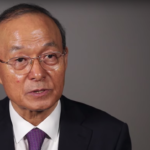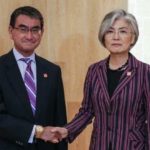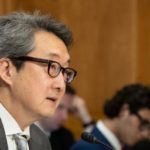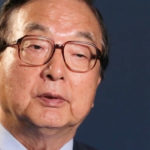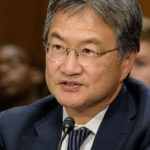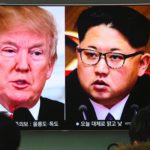November 13, 2019—
This Living History interview features former South Korean minister of foreign affairs and trade, Song Min-soon. Song was director general for North American affairs and chief delegate during the six-party talks in 2005. He played a key role in the multilateral denuclearization agreement with North Korea, involving the United States, Japan, South Korea, China, and Russia, achieved in September 2005.
August 22, 2019, by Victor Cha—
The South Korean government announcement of its intention not to renew the General Security of Military Information Agreement (GSOMIA) represents escalation of the Japan-Korea dispute after each side removed the other from preferential trading arrangements (so-called "whitelists").
April 30, 2019—
This Living History features an interview with Ambassador Kathleen Stephens who served as the United States Ambassador to the Republic of Korea from 2008 to 2011. In the second of this two-part interview series with Ambassador Stephens, she reflects on some key agreements and diplomatic achievements made between the U.S. and South Korea during her tenure as the top diplomat in Seoul.
March 28, 2019, by Victor Cha—
Dr. Victor Cha, senior adviser and Korea Chair for CSIS, testified before the U.S. Senate Committee on Foreign Relations Subcommittee on East Asia, the Pacific, and International Cybersecurity Policy on “U.S. Policy Toward North Korea After the Second Summit.”
January 30, 2019—
This Living History features an interview with Ambassador Kathleen Stephens who served as the United States Ambassador to the Republic of Korea from 2008 to 2011. In the first of this two-part interview series with Ambassador Stephens, she reflects on her experience serving as a young Peace Corps volunteer from 1975 to 1977 in rural South Chungcheong province and as a junior diplomatic officer in the early 1980s at the U.S. Embassy in Seoul.
December 18, 2018—
This Living History interview features Ambassador Chung Chong Wook, former Republic of Korea ambassador to China and former senior secretary to President Kim Young-sam for national security and foreign policy. Ambassador Chung recounts his personal experience serving as a senior government official during the summer of 1994 that was marked by a series of critical events in inter-Korean and U.S.-South Korea-North Korea relations.
August 23, 2018—
This Living History interview features Ambassador Joseph Yun, former U.S. Special Representative for North Korea Policy and Deputy Assistant Secretary for Korea and Japan at the Bureau of East Asian and Pacific Affairs. Ambassador Yun recounts his diplomatic experience negotiating with the North Koreans and a series of efforts to maintain a direct line of communication with his counterparts. He also discusses his role in bringing back a detained U.S. citizen, Otto Warmbier, from North Korea.
June 11, 2018, by Gordon LaForge and Philip Trevisan—
On the eve of the Trump-Kim Summit, Predata signals capturing patterns of web traffic reveal a North Korean regime secure in its place and an expert community skeptical that the historic meeting will produce meaningful results. .. On the eve of the Trump-Kim Summit, Predata signals capturing patterns of web traffic reveal…
June 11, 2018, by Victor Cha—
There has been much criticism of President Trump's impulsive actions and the unconventionality of the Singapore Summit. However, absent a complete breakdown of the encounter between the leaders, the summit is likely to produce a negotiation process between the United States and North Korea that will implement the mandates laid out by the leaders on denuclearization, security assurances, and a peace process on the Korean peninsula.
June 8, 2018, by Victor Cha and Marie DuMond—
With the Singapore Summit between Donald Trump and Kim Jong-un on June 12, there is bound to be references made by the North Korean leader to the need to end U.S. “hostile policy” as a precondition for denuclearization. However, CSIS Beyond Parallel research shows that North Korean citizens do not hold uniformly negative impressions of the United States, contrary to the statements of North Korean leaders. A study commissioned by Beyond Parallel of North Koreans currently living inside the country found 68% North Korean respondents do not see the United States as North Korea's enemy.
